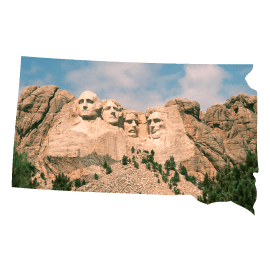Secondary Content Knowledge: South Dakota
Secondary Teacher Preparation Policy
Analysis of South Dakota's policies
Content Test Requirements: South Dakota offers single-subject secondary licenses to teach grades 5-12. Secondary candidates have the option of passing a single-subject Praxis content test or earning an academic major in the applicable content area.
Endorsements: South Dakota allows teachers to add additional endorsements by passing a Praxis content test or having an academic major in the applicable content area.
Secondary Licensure Deficiencies: Unfortunately, South Dakota allows both general science and general social studies licenses without requiring subject-matter testing for each subject area within these disciplines. Because secondary content testing loopholes are scored in Secondary Licensure Deficiencies, it is not considered as part of the score for the Secondary Content Knowledge goal.
Provisional and Emergency Licensure: Because provisional and emergency licensure requirements are scored in Provisional and Emergency Licensure, only the test requirements for the state's initial license are considered as part of this goal.
Recommendations for South Dakota
Require subject-matter testing for secondary teacher candidates.
As a condition of licensure, South Dakota should require its secondary teacher candidates to pass a content test in each subject area they plan to teach to ensure that they possess adequate subject-matter knowledge and are prepared to teach grade-level content.
Require subject-matter testing when adding subject-area endorsements.
South Dakota should require passing scores on subject-specific content tests, regardless of other coursework or degree requirements, for teachers who are licensed in core secondary subjects and wish to add another subject area, or endorsement, to their licenses. Although coursework may be generally indicative of background in a particular subject area, only a subject-matter test ensures that teachers know the specific content they will need to teach.
State response to our analysis
South Dakota did not respond to NCTQ's request to review this analysis for accuracy.
Updated: March 2018
Select another topic
Teacher Preparation
- Program Entry
- Teacher Shortages and Surpluses
- Program Performance Measures
- Program Reporting Requirements
- Student Teaching/Clinical Practice
Elementary Teacher Preparation
Secondary Teacher Preparation
- Middle School Content Knowledge
- Middle School Licensure Requirements
- Secondary Content Knowledge
- Secondary Licensure Requirements
Special Education Teacher Preparation
Alternate Routes
Teacher Diversity
Hiring
Teacher and Principal Evaluation
Teacher Compensation
Early Childhood Preparation
Retaining Effective Teachers
How we graded
3D: Secondary Content Knowledge
- Content Tests: The state should require that all new secondary teachers pass a separately scored subject-matter test in every subject they are licensed to teach.
- Additional Endorsements: The state should require that all secondary teachers pass a separately scored subject-matter test when adding subject-area endorsements to an existing license.
One-half of the total goal score is earned based on the following:
- One-half credit: The state will earn one-half of a point if it requires all new secondary teachers to pass a separately scored licensing test in every subject they are licensed to teach.
One-half of the total goal score is earned based on the following:
- One-half credit: The state will earn one-half of a point if it requires all secondary teachers to pass a separately scored content test to add subject-area endorsements to an existing license.
Research rationale
Completion of coursework provides no assurance that prospective teachers know the specific content they will teach. Secondary teachers must be experts in the subject matter they teach, and a rigorous, subject-matter specific test ensures that teacher candidates are sufficiently and appropriately knowledgeable in their content area. In fact, research suggests that a positive correlation exists between teachers' content knowledge and the academic achievement of their students.[1] Coursework is generally only indicative of background in a subject area; even a major offers no certainty of what content has been covered. A history major, for example, could have studied relatively little American history or almost exclusively American history. To assume that the major has adequately prepared the candidate to teach American history, European history, or ancient civilizations is an unwarranted leap of faith, whereas a rigorous content test could verify aspiring teachers' knowledge in each topic area.
Requirements should be just as rigorous when adding an endorsement to an existing license. Many states will allow teachers to add a content area endorsement to their license simply on the basis of having completed coursework. As described above, the completion of coursework does not offer assurance of specific content knowledge. Even states that require a content test for initial licensure should require an additional content test for adding an endorsement.
[1] Monk, D. (1994). Subject-area preparation of secondary mathematics and science teachers and student achievement. Economics of Education Review, 13(2), 125-145; Goldhaber, D. D., & Brewer, D. J. (1997). Why don't schools and teachers seem to matter? Assessing the impact of unobservables on educational productivity. Journal of Human Research, 32(3), 505-523.; National Council on Teacher Quality. (2010). The all-purpose science teacher: An analysis of loopholes in state requirements for high school science teachers. Retrieved from http://www.nctq.org/p/publications/docs/NCTQ_All_Purpose_Science_Teacher.pdf; National Council on Teacher Quality. (2014). Infographic on secondary certification. Retrieved from http://www.nctq.org/dmsView/NCTQ_-_Standard_7,8_Groundwork_-_Infographic_on_Secondary_Certification; For consideration for elementary teachers' need to master content knowledge, see: Goldhaber, D. (2007). Everyone's doing it, but what does teacher testing tell us about teacher effectiveness? Journal of Human Resources, 42(4), 765-794.; See also: Harris, D. N., & Sass, T. R. (2011). Teacher training, teacher quality and student achievement. Journal of Public Economics, 95(7), 798-812. Retrieved from
http://files.eric.ed.gov/fulltext/ED509656.pdf; For research on this effect specific to reading achievement: Carlisle, J. F., Correnti, R., Phelps, G., & Zeng, J. (2009). Exploration of the contribution of elementary teachers' knowledge about reading to their students' improvement in reading. Reading and Writing, 22(4), 457-486.

